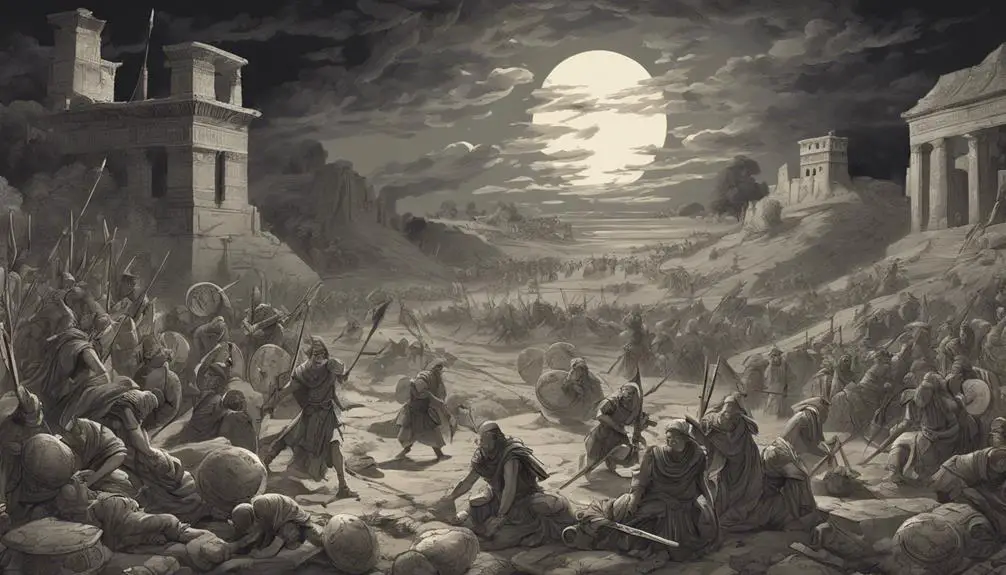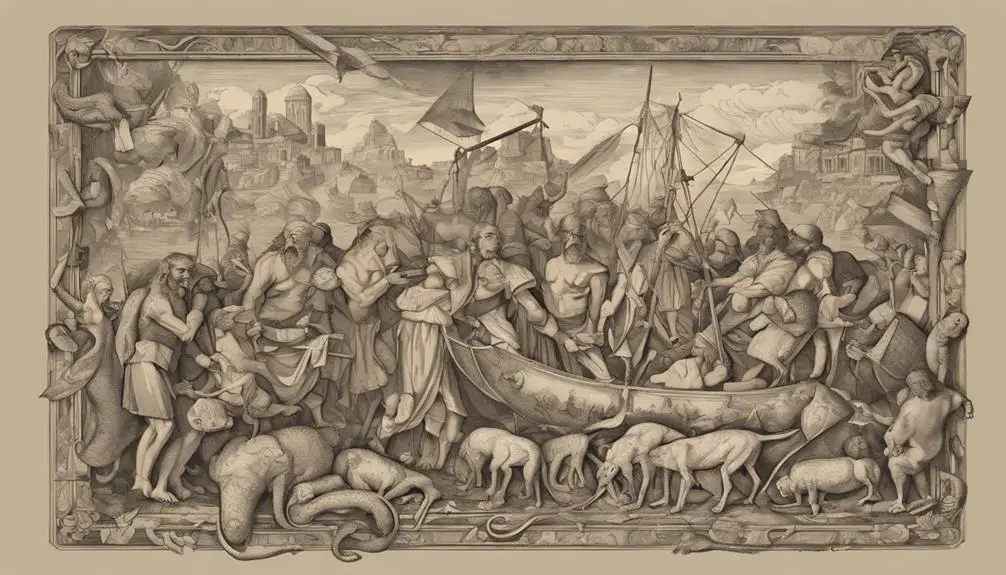Plunder in the Bible unveils a complex interplay of morality and wealth, urging a deeper exploration of ancient ethics and modern reflections.

What Does Plunder Mean in the Bible
Plunging into the past, you'll find that plunder permeates pages of the Bible, presenting both puzzle and purpose. As you explore this ancient text, you'll discover the diverse dimensions that define plunder, from physical spoils to spiritual significance.
This term, steeped in historical contexts, often blurs the lines between victory and violence. But why does it matter, and how does it resonate with ethical implications and modern interpretations?
Your journey into the biblical understanding of plunder promises to reveal insights that might challenge your perspectives on wealth, war, and morality. Let's uncover what lies beneath the surface.
Key Takeaways
- Plunder in the Bible signifies goods seized during warfare, reflecting historical and cultural contexts.
- It played a crucial role in the economic sustenance and territorial expansion of ancient societies.
- Biblical narratives, such as Jericho's spoils, illustrate the moral complexities surrounding plunder.
- Ethical considerations in biblical texts highlight the moral responsibility and societal impacts of plundering.
Defining Biblical Plunder

In the context of the Bible, 'plunder' refers to the goods or wealth seized during the course of warfare or conflict, emphasizing the spoils taken from conquered peoples or territories. You'll find that the concept of plunder is deeply rooted in the historical and cultural milieu of biblical times. The origins of plunder, as depicted in the Bible, are intricately tied to the practices and customs of ancient warfare, where victors claimed the possessions of the defeated as a right of conquest.
Analyzing the various translations of the Bible, you'll notice variations in how 'plunder' is represented. These translation variations often hinge on the original Hebrew and Greek terms used, reflecting different nuances of meaning. For instance, words translated as 'plunder' in some versions may appear as 'spoil' or 'booty' in others, each carrying slightly different connotations. This linguistic diversity underscores the complexity of biblical language and the importance of context in interpreting the concept of plunder.
Understanding plunder's origins and its representation across translations helps you appreciate the multifaceted nature of biblical narratives. It allows for a deeper exploration of the socio-economic and moral implications of war and conquest as depicted in the biblical text.
Historical Contexts of Plunder

Throughout history, you'll find that the act of plundering wasn't merely opportunistic but deeply embedded in the strategies and economies of ancient civilizations engaging in warfare. This practice was a fundamental aspect of conquest strategies and territorial expansions, shaping the destinies of empires and states. To understand its significance, consider the following:
- Economic Foundation: Plunder served as a critical economic foundation. Victorious armies relied on the seizure of wealth to fund further campaigns and sustain their dominance. This wealth often came in the form of precious metals, livestock, and enslaved individuals, contributing significantly to the victor's economy.
- Territorial Expansion: The acquisition of land through conquest was intricately linked to plunder. Territories weren't just land masses but repositories of resources. Conquering new lands meant access to these resources, which could be exploited or sold, fueling further expansion and consolidation of power.
- Psychological Warfare: Beyond tangible benefits, plunder was a tool of psychological warfare. The threat or act of plundering could demoralize enemy forces and civilian populations, making them more likely to surrender or capitulate.
In this light, plunder transcends simple theft, embodying a complex interplay of economic, strategic, and psychological dimensions within the historical contexts of ancient warfare.
Plunder in Key Narratives

Delving into key narratives reveals how plunder, as a strategic and economic tool, was pivotal in shaping the outcomes and moral lessons of biblical stories. Specifically, the tale of Jericho's spoils and Achan's consequence stands out as a primary example of the complexities surrounding the acquisition and misuse of plunder.
When the Israelites conquered Jericho, they were instructed by God to devote the city and its possessions to destruction, except for the silver, gold, bronze, and iron, which were to be consecrated to the Lord and placed in His treasury. This directive highlights the sacred dimension attributed to plunder in certain contexts, transforming it from mere spoils of war to an offering to God.
However, the narrative takes a dark turn with the story of Achan, who violated this divine command by secretly keeping some of the spoils for himself. Achan's consequence was severe—his actions brought defeat to the Israelites in their next battle and led to his eventual exposure and punishment. This episode underscores the moral and spiritual implications of disregarding divine instructions regarding plunder. It serves as a cautionary tale on the dangers of greed and disobedience, emphasizing the profound impact that the treatment of plunder can have on community welfare and divine favor.
Ethical Implications

Exploring the ethical implications of plunder in biblical contexts reveals a complex tapestry of moral considerations, where actions and intentions are scrutinized under divine law. You're invited to delve deeper into the subject, considering the overarching moral responsibility that comes with the act of plundering, and its wider societal impacts.
- Moral Responsibility: The Bible often presents plunder within narratives that demand a deeper understanding of justice and righteousness. You're encouraged to reflect on how moral responsibility is depicted, especially in the context of victors and the vanquished. This includes examining the heart and the motives behind the act of taking what belongs to others, and whether such actions can ever be justified under divine law.
- Societal Impacts: The repercussions of plunder extend beyond the immediate loss of goods. You're prompted to consider how these acts affected societal structures, relationships between communities, and the long-term dynamics of peace and conflict.
- Divine Law and Human Action: Finally, the role of divine law in guiding human actions towards justice and mercy is crucial. You're asked to analyze how biblical narratives use the concept of plunder to teach lessons about adherence to divine commands and the pursuit of a moral life.
In dissecting these ethical implications, it becomes clear that the Bible's treatment of plunder isn't just historical recounting but a medium for conveying enduring lessons on morality and justice.
Modern Interpretations

After examining the ethical implications of plunder in biblical contexts, let's now turn our attention to how these historical perspectives are interpreted and applied in modern discussions. You'll find that these ancient narratives have profound relevance today, especially in the realms of social justice and cultural appropriation.
In the context of social justice, the concept of plunder is critically analyzed to understand economic disparities and historical injustices. You're encouraged to consider how wealth and resources have been historically extracted from marginalized communities, echoing the biblical instances of plunder. This reflection fosters a deeper understanding of systemic inequalities and prompts action towards equitable distribution of resources.
Cultural appropriation, a modern form of plunder, involves the unauthorized taking from minority cultures without proper acknowledgment or compensation. Here, you're invited to draw parallels with biblical teachings on respect and fairness. This analysis not only highlights the ethical breaches in cultural appropriation but also advocates for a respectful exchange of cultural elements.
Frequently Asked Questions
How Has the Concept of Plunder Influenced Contemporary Religious Practices or Rituals?
In contemporary religious practices, the concept of plunder has evolved, shaping rituals with rich symbolism.
You'll find modern adaptations where plunder represents overcoming spiritual battles, akin to historical narratives of victory and divine favor.
This transformation highlights a methodical reinterpretation, infusing ancient tales with current meanings.
Plunder symbolism in rituals now emphasizes moral and spiritual triumph, showcasing how these practices have meticulously adapted to reflect both reverence and resilience in faith.
Are There Any Notable Differences in the Interpretation of Plunder Among Different Christian Denominations or Other Religions?
You'll find that denominational perspectives and cultural interpretations significantly influence how plunder is understood among various Christian sects and other religions. Each group analyzes the concept through their theological lens, leading to nuanced differences.
These interpretations are rooted in historical contexts and doctrinal teachings, shaping a diverse religious landscape. It's vital to examine these distinctions methodically to grasp the full spectrum of religious thought regarding plunder.
How Has the Translation of the Term "Plunder" Evolved in Various Versions of the Bible Over Time?
You're diving into how 'plunder' has shifted in Bible translations over time. It's all about pinpointing translation accuracy while considering cultural context.
By comparing versions, you'll see nuances emerge—some translations lean towards direct equivalency, others adapt to modern language sensibilities. This evolution reflects a balancing act: staying true to original texts and making them accessible to today's readers.
Analyzing these changes offers a methodical glimpse into the complexities of biblical language interpretation.
Can Examples of Plunder in the Bible Be Correlated With Archaeological Findings or Historical Events Outside of the Biblical Narrative?
Yes, you can find correlations between plunder motifs in the Bible and archaeological discoveries or historical events. However, it's fraught with archaeological controversies.
Scholars meticulously analyze artifacts and records to draw connections, but it's not always straightforward. These findings often support or challenge biblical narratives, making your understanding richer yet more complex.
You'll encounter debates and differing interpretations, reflecting the intricate relationship between biblical accounts and historical evidence.
How Do Theologians Reconcile the Acts of Plunder With the Moral and Ethical Teachings of Christianity Today?
To navigate the ethical paradoxes surrounding acts of plunder, theologians often explore divine justification. They meticulously analyze how these actions, seemingly at odds with Christian morals, align with God's broader purposes.
Conclusion
In analyzing biblical texts, you've navigated through the multifaceted concept of plunder, contextualized historically and narratively.
You've observed how plunder, within biblical stories, isn't merely an act of looting but carries deep ethical and theological implications.
This exploration into key narratives illuminated the complexity of moral quandaries faced by biblical figures.
Modern interpretations further challenge you to consider the relevance of these ancient perspectives in today's ethical discourse, urging a nuanced understanding of historical texts in contemporary moral reflection.



Sign up